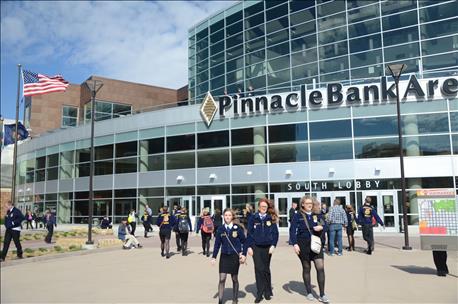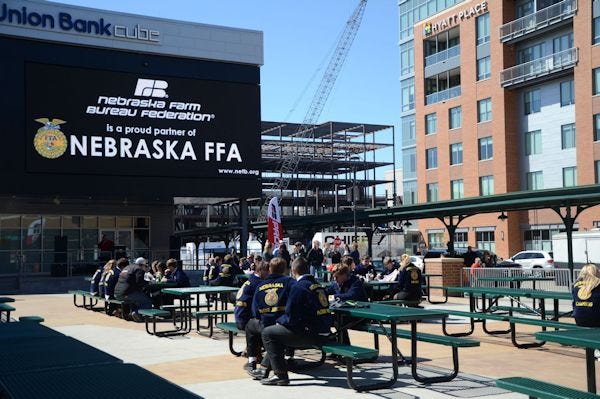
Lincoln's historic Haymarket was once again flooded with blue and gold as FFA members from across Nebraska gathered for the 88th annual Nebraska State FFA Convention last week.
This year was also the State Convention's fourth annual Nebraska FFA Agriscience Fair. Matt Kreifels, Nebraska Agricultural Education state supervisor, says the purpose of the Agriscience Fair is to build awareness and cultivate an interest in science by researching a range of current agricultural issues. But it also helps broaden their horizons through networking – giving them the chance to interact with fellow students, educators, researchers, and industry representatives.

"Agriculture is not only the most important industry in Nebraska, but it's science at its heart," says Kreifels. "For students to have the opportunity at the middle school and high school level to engage in thinking about agriculture as a science, it will help open their minds to those research-based careers to help us think about how we're going to feed 9 billion people."
The contest, sponsored by DuPont Pioneer and CHS Foundation, is open to FFA members from middle school through high school. Participants are divided up into different contests based on grade and career pathways – animal systems, plant systems, food products and processing systems, environmental services/natural resource systems, social systems, and power, structural and technical systems. Students research topics like the effects of growth hormones on meat and milk production, chemical effects on water quality and the effects of packaging techniques on food spoilage rates.

"In the animal science world it might be nutrition based – would an animal put on more weight, more muscle mass given certain types of diets? In the plant world it might involve different filters of light – what spectrum of light helps to produce vegetative growth for different kinds of plants?" Kreifels says, noting his daughter, Madison, a seventh grader in the Syracuse FFA Chapter who participated in the contest for the first time this year. "They were trying to research growing algae and how different environmental factors would enhance algae growth for the purposes of renewable energy resources."
Participants go through the scientific process, develop a hypothesis, conduct an experiment, and meet with judges at the State Convention to present research findings. They also create a display, turn in a logbook, abstract summary, review of literature report, materials and methods report, results report and conclusion report to be judged.

The Agriscience Fair brings a new kind of out-of-class experience for students, Kreifels adds. "If you go back to the beginnings of FFA when it was just young men who had livestock or grew some crops, that was their out-of-class experience," he says. "Today we are fortunate to have both young women and men in FFA, including students who come from non-ag backgrounds. Not every student has access to the resources that all farm kids do. This allows them to dip their toes into ag experiments and it connects them with industry professionals in their community to serve as mentors. Then, once they're at State FFA Convention, students are paired up with industry professionals at the statewide level."
Division award winners also receive a cash award, and many participating students will qualify to take their projects on to the National FFA Convention in Indianapolis in October. "We started this contest four years ago. We had around 65 exhibits in the Agriscience Fair when we first started, and we are pushing about 140 this year," Kreifels says. "It's growing by leaps and bounds in Nebraska."
About the Author(s)
You May Also Like






